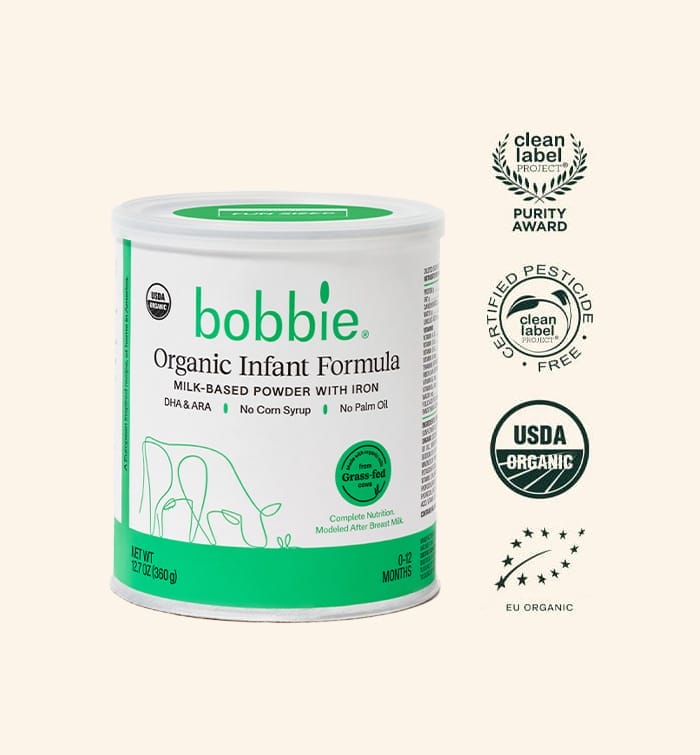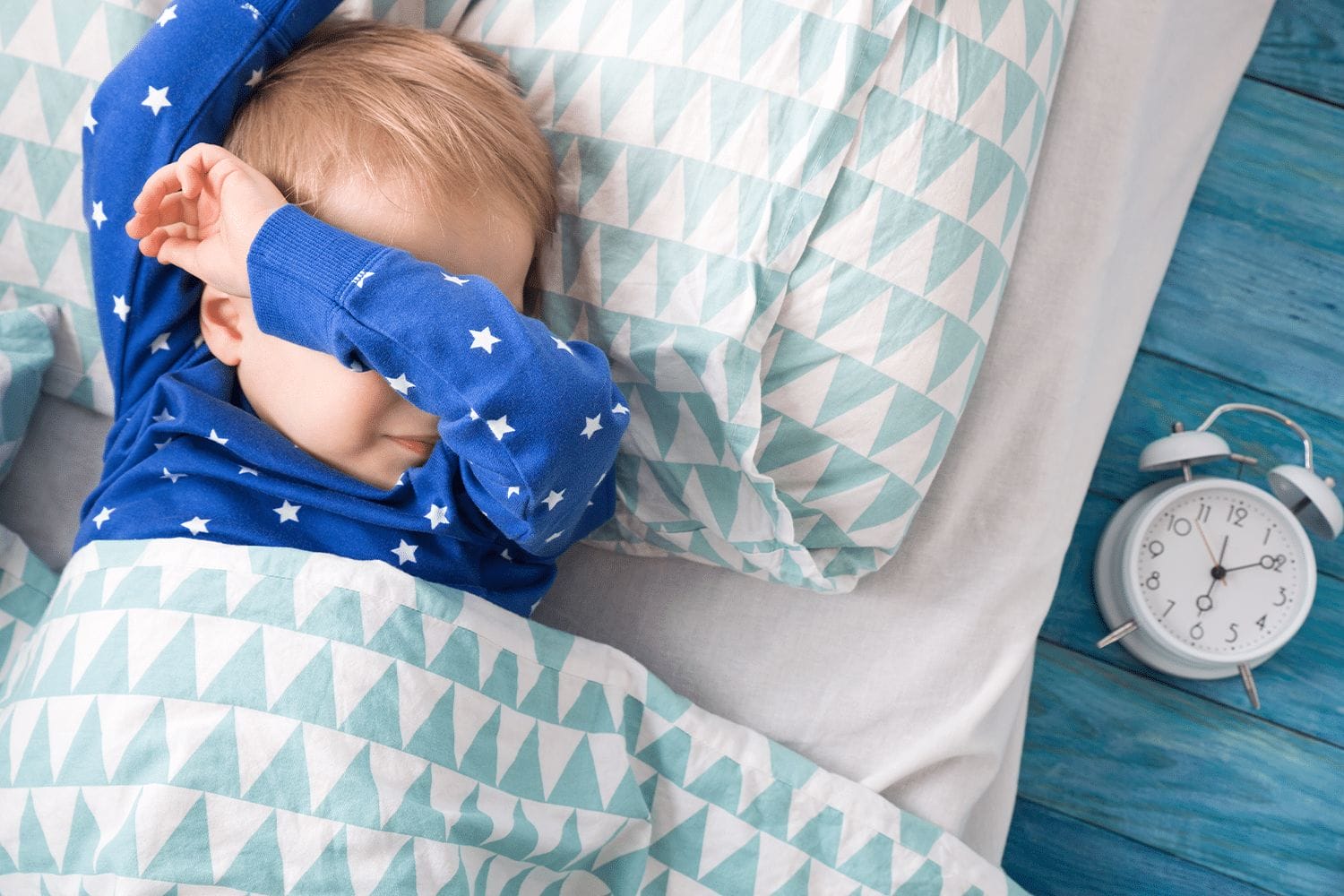We are proud to say that these posts are not sponsored. Our editorial team of Bobbie moms and writers personally select each featured product. If you buy something through our links, we may earn an affiliate commission, at no cost to you.
Sleep is a beautiful thing, and for your baby, it’s more important than ever!
But, is there such a thing as too much sleep? When it comes to the development of your baby, it can be kind of hard to tell. So, allow us to shed some light on this subject!
Together, we’re going to look at how much sleep your baby needs, what to do when they need to be fed, and how to know if they are sleeping too much or eating too little.
All of these answers are essential for the proper health and safety of your baby. That’s why we want to give you all the answers you’re looking for, so you can make the right choices for your newborn.
Here we go!

Shop Bobbie Organic Infant Formula
Bobbie Organic Infant Formula is a USDA Organic, EU-style infant formula that meets all FDA requirements. It is a complete nutrition milk-based powder modeled after breast milk and is easy on tummies. It is non-GMO and doesn't have corn syrup, palm oil, or maltodextrin. Learn more about Bobbie.
Should Newborns Be Woken Up?
The short answer is YES! It’s perfectly okay for your newborn to be woken up in order to eat. Otherwise, they may sleep through their feedings and not be able to develop or grow to a good, healthy weight.
It’s also normal to wake up your newborn right after birth. They don’t have that internal alarm clock yet, and it needs to develop. Until then, your baby needs to eat every three to four hours. They will continue to eat every 4 hours until they show good weight gain for the first couple of weeks.
After they’ve begun their development patterns, your baby can sleep for longer periods of time especially at night. This creates a safe routine for both you and your baby.
The experts at Moms on Call say, “starting around 2-4 weeks of age never wake a healthy, sleeping baby (that is growing and thriving) at night – but wake them up all day long.”
When Should Your Baby Be Woken Up?
Newborns typically wake up every couple of hours in order to feed. If they are a breastfed baby, then it’s normally about every two to three hours.
However, if they take their breastmilk or formula by the bottle, then the feeding can occur about every three to four hours.
It can be hard to know how to set up the routine for your new little one, but it will definitely get easier especially during the night as you go along.
How Should Your Baby Sleep?
Knowing how your baby should sleep is just as important as knowing when to wake them up for their feedings.
Both are super essential for their development and safety. By following these recommendations, your newborn will be on a better track to a healthier and safer routine after the first few weeks of birth.
Place Them on Their Back, Not Stomach
A lot of the times babies will risk Sudden Infant Death Syndrome when they’re put to bed on their stomach or side. Since the AAP introduced this specific recommendation to only place babies on their back in 1992, newborns have been a lot safer statistically.
Use a Firm Sleep Surface
This is a safety standard to ensure your baby does not suffocate during sleep. If the bed is too soft and your baby sinks in, then they may not be able to breathe properly.
Also, by having a firm mattress, your baby will get the essential back support they need.
Don’t Place Other Items in the Crib
Remember, less is more! It’s a huge safety hazard to have anything else besides your baby in their crib. Just as having a soft mattress in the crib is unsafe, the same goes if your baby has access to any stuffed animals, pillows, bumpers, or lovies which can lead to suffocation.
The reasoning for this is because babies do not have the awareness to know if they are suffocating. If this does occur, they also will not have the physical strength to help themselves or even call for help.
Avoid the Opportunity for Overheating
It can be easy to over bundle your newborn, especially in the wintertime. We totally understand that you don’t want your baby to get cold during the night, but it’s a lot more of a safety risk if they overheat.
To check and see if they’re overheating, look for signs of sweating or feeling hot to the touch.
In other warmer seasons, such as spring and summer, make sure to not bundle your baby whatsoever because they can get too hot during the night.
Do Not Allow Your Baby to Be in a Room with Smokers
Did you know that secondhand smoke is actually a big risk factor for sudden infant death syndrome?
If babies are exposed to smoke at a super young age, their lungs aren’t fully developed enough yet to combat it on its own. It’s super important for your baby to be sleeping in an environment with clean and healthy air at all times.
You can also purchase dehumidifiers or air purifiers as a way to improve the air quality in the room where your baby sleeps.
Use a Pacifier
A pacifier can be used for extra soothing comfort.
However, not all babies enjoy this, so don’t force it on them. If their pacifier falls out during sleep, you don’t need to replace it. Some new styles of pacifiers are attached to a small stuffed animal, try to avoid letting a newborn baby sleep with these in their crib as an additional safety measure.
If you’re breastfeeding, it might be best to wait until they’re used to this feeding method before introducing a pacifier. With a pacifier in the mix, it could confuse your infant.
How Many Hours Do They Sleep?
According to the National Sleep Foundation, it’s actually recommended that newborns can get about 14 to 17 hours of sleep per day.
Because we know that every baby is different, this timeframe can vary greatly. It’s been reported that some babies only sleep for 11 hours while others may sleep for up to 19 hours per day.
The two main reasons for their sleep or lack thereof might be because they are sick or if there is a disruption in their regular routine.
It’s also pretty common for babies to have sleep bursts, meaning they will only be asleep for about 30 to 45 minutes at a time, or only as long as about three to four hours. Plus, in the first few weeks, they may not have a set routine, so this can definitely change a lot.
How to Know If They’re Sleeping Too Much
There’s actually a ton of signs and reasons to look for that may explain why your baby is sleeping too much. Take a look at the following reasons that may be why your little one is sleeping so much:
- They might be going through a growth spurt or developmental leap.
- They could have a minor illness.
- They might have just received immunizations.
- Good quality of sleep patterns may not be established yet.
- The baby might also be lethargic as a result of jaundice.
There are also signs that will indicate if your baby isn’t getting enough to eat either. These include:
- Your baby is lethargic or unresponsive.
- They’re gaining less than 6 ounces per week.
- They’re producing fewer than four wet diapers per day.
- They’re not calm after eating.
What Happens if Your Baby is Sleeping Too Much?
Do you think your baby is sleeping too much? Don’t panic. Maybe they are or maybe they’re not, but either way, there is definitely a good explanation. They could just be on an irregular schedule that neither of you are used to.
However, health issues can definitely play a factor in your baby’s development, so it’s especially important to take the precautionary measures to make sure that nothing is happening that shouldn’t be.
By following these methods, you can ensure that your baby isn’t sleeping too much and is eating properly.
- Feed your baby every time they show hunger cues.
- Give them the breast or bottle every 2-3 hours to ensure adequate food intake.
- Make sure your infant isn’t too hot or too cold.
- Keep a log of your baby’s sleep schedule for 1-2 days to verify that it’s normal and consult a doctor if needed.
If you’re ever in doubt about your baby’s health, make sure to contact your pediatrician, as they will know best what steps to take. They will also be able to make sure that your baby’s needs are met with the proper care going forward.
Most of the time, too much sleep is not necessarily a medical emergency, unless of course there’s respiratory problems associated with it.
Here are some red flag signs to watch out for:
- Gasping or wheezing
- Loud or heavy breathing
- Flaring nostrils when breathing
- Skin around your baby’s ribs sinks in when breathing
- Fever
- You believe they have inhaled or eaten something toxic
Our Final Thoughts
Do you think your baby might be sleeping too much or eating too little? It’s always best to take a breath and assess the signs your baby may be exhibiting. Keeping a log or journal of food intake and sleeping patterns is always a great idea and can bring you a little peace of mind.
Remember, that your baby might also need to simply get used to a set routine before they establish a set sleeping schedule. All infants are different and unique in the way they react, especially in the first few weeks after birth. But in the end, all babies generally grow to love sleep, just like mommy and daddy!

Shop Bobbie Organic Infant Formula
Bobbie Organic Infant Formula is a USDA Organic, EU-style infant formula that meets all FDA requirements. It is a complete nutrition milk-based powder modeled after breast milk and is easy on tummies. It is non-GMO and doesn't have corn syrup, palm oil, or maltodextrin. Learn more about Bobbie.
Sources:
https://kidshealth.org/en/parents/sleepnewborn.html
https://www.medicalnewstoday.com/articles/322565#waking-for-feeding
https://www.sleepfoundation.org/sites/default/files/STREPchanges_1.png

